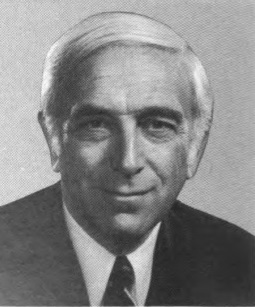Frank Lautenberg facts for kids
Quick facts for kids
Frank Lautenberg
|
|
|---|---|
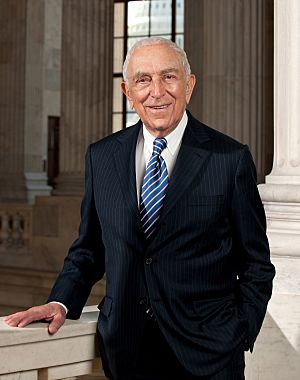 |
|
| United States Senator from New Jersey |
|
| In office January 3, 2003 – June 3, 2013 |
|
| Preceded by | Jeffrey Chiesa |
| Succeeded by | Robert Torricelli |
| In office December 27, 1982 – January 3, 2001 |
|
| Preceded by | Nicholas Brady |
| Succeeded by | Jon Corzine |
| Personal details | |
| Born |
Frank Raleigh Lautenberg
January 23, 1924 Paterson, New Jersey, U.S. |
| Died | June 3, 2013 (aged 89) New York City, New York, U.S. |
| Resting place | Arlington National Cemetery |
| Political party | Democratic |
| Spouses |
Lois Levenson
(m. 1956; div. 1988)Bonnie Englebardt
(m. 2004) |
| Children | 4 |
| Education | Columbia University (BS) |
| Signature | |
| Military service | |
| Allegiance | United States |
| Branch/service | United States Army |
| Years of service | 1942–1946 |
| Rank | |
| Unit |
|
| Battles/wars | World War II |
Frank Raleigh Lautenberg (January 23, 1924 – June 3, 2013) was an American businessman and Democratic politician. He served as a U.S. Senator for New Jersey from 1982 to 2001, and again from 2003 until his death in 2013. He was originally from Paterson, New Jersey.
Lautenberg was elected five times as Senator. He first took office in December 1982 and served three terms. He retired from the Senate in 2001. One year later, he was asked to run again due to issues with his Senate colleague Robert Torricelli's re-election campaign. Lautenberg returned to the Senate in January 2003. He was elected for one more term in 2008. He died during his fifth term. He is New Jersey's longest-serving senator, with over 28 years in office.
Before politics, he was an early partner and later CEO of Automatic Data Processing (ADP). In his younger years, he served in the U.S. Army Signal Corps during World War II from 1942 to 1946. After the war, he became more interested in American politics. He was known for supporting funding for Amtrak and public transportation. He also pushed for stronger environmental rules and greater consumer protections.
Contents
Early Life and Career
Lautenberg was born in Paterson, New Jersey. His parents, Mollie and Sam Lautenberg, were Jewish immigrants from Poland and Russia. They had come to the United States as babies. He was named after his grandfather, Frank Bergen.
When Lautenberg was 19, his father died of cancer. His father had worked in silk mills, sold coal, farmed, and ran a tavern. After his father's death, his mother opened a sandwich shop to support the family.
After graduating from Nutley High School in 1941, Lautenberg served in the United States Army Signal Corps during World War II. He served overseas from 1942 to 1946. After the war, he used the GI Bill to pay for college. He graduated from Columbia Business School in 1949 with a degree in economics.
He worked as a salesman for Prudential Insurance. He was the first salesman at Automatic Data Processing (ADP), a company that helps manage payroll. He became the company's CEO in 1975. From 1978 to 1982, he was an executive commissioner for the Port Authority of New York and New Jersey.
U.S. Senator
First Time in the Senate
Lautenberg supported Democratic candidates for many years. In 1972, he gave $90,000 to George McGovern's presidential campaign. This put him on one of Richard Nixon's "enemies lists." In 1982, he ran for the Democratic nomination for the U.S. Senate. He faced nine other candidates. Lautenberg won the primary election by spending a lot of his own money.
The Senate seat was open because Democrat Harrison A. Williams had resigned. Republican Governor Thomas Kean had appointed Republican Nicholas F. Brady to fill the seat temporarily. In the general election, Lautenberg ran against popular Republican congresswoman Millicent Fenwick. She was ahead in the polls by a lot. Lautenberg spent more money than Fenwick. He talked about President Reagan's low popularity. He also pointed out that Fenwick, who was 72, would be nearly 80 by the end of her first term. Lautenberg won by a small margin, which was a big surprise. Brady resigned a few days early, allowing Lautenberg to start his term sooner. This gave him a small advantage in seniority over other new senators.
In his first term, Lautenberg helped pass the National Minimum Drinking Age Act in 1984. This law set the drinking age at 21 across the country.
In 1988, Lautenberg ran for re-election. He was challenged by Republican Pete Dawkins, a former college football star. Lautenberg's campaign ran strong ads about his achievements. They also questioned if Dawkins was serious about New Jersey. Lautenberg won re-election.
After his re-election, Lautenberg joined a commission on aviation security. This group was formed after the bombing of Pan Am Flight 103 in 1988.
Lautenberg was re-elected again in 1994. He won against Chuck Haytaian.
In 1999, Lautenberg considered retiring. He was thinking about how hard it would be to raise money for another campaign. He also had some disagreements with his fellow New Jersey Senator Robert Torricelli. He announced his retirement in 2000. Jon Corzine was elected to replace him.
Return to the Senate in 2002
Lautenberg soon regretted leaving the Senate. He missed his work there. He thought about running again, but it seemed difficult. However, an opportunity came up a little over a year after he left office.
In 2002, Senator Torricelli was running for re-election. But an investigation into his business dealings led to federal charges. Torricelli decided to leave the race on September 30, 2002.
The New Jersey Democratic Party asked Lautenberg to run. He accepted the nomination. This was challenged by the Republican candidate, Doug Forrester. New Jersey law usually did not allow replacing candidates so late. However, the New Jersey Supreme Court said the law did not cover emergency resignations. They allowed Lautenberg to be on the ballot. The U.S. Supreme Court did not take up the case. With Lautenberg in the race, his popularity helped him win the election. He defeated Forrester by a margin of 54% to 44%.
Back in the Senate
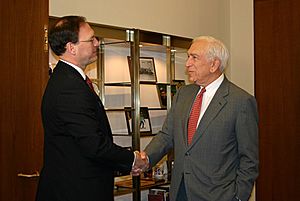
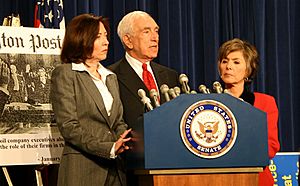
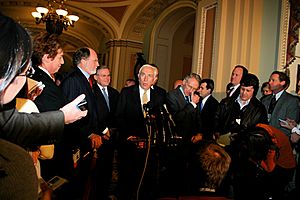
Even though Lautenberg had served many years, when he returned, he was treated like a new senator in terms of seniority. He was given a less important office space. He was reportedly unhappy about this.
Back in the Senate, Lautenberg was known as a very liberal member. He supported gun control. He introduced bills to increase penalties for carjacking and car theft. He also criticized the Bush administration on national security issues. He was very involved in laws about anti-smoking and airline safety. He is perhaps best known for writing the law that banned smoking on most commercial airline flights. He also wrote the Ryan White Care Act, which helps people with AIDS.
In 2005, he called for an investigation into certain government payments to writers.
When Jon Corzine left the Senate to become Governor of New Jersey in 2006, Lautenberg became the senior senator again. This made him the only person to have been both the junior and senior senator from New Jersey twice.
In 2007, Lautenberg proposed a law to stop people on the terrorist watchlist from buying weapons. On June 21, 2007, he cast more votes on the Senate floor than any other New Jersey Senator in history.
2008 Re-election
In February 2006, Lautenberg announced he would run for re-election in 2008. He said that not running in 2000 was "among the worst decisions of his life." He formally announced his candidacy on March 31, 2008.
Congressman Rob Andrews challenged Lautenberg in the Democratic primary. Lautenberg defeated Andrews by 59% to 35%. He then won against former Congressman Dick Zimmer in the general election.
Both opponents mentioned Lautenberg's age as a reason not to vote for him. Lautenberg was 84 in 2008. He denied that he had made age an issue in his 1982 race against Millicent Fenwick. He said he only questioned Fenwick's "ability to do the job."
Final Years in Office
In June 2010, Lautenberg made some comments comparing Dubai to the devil. He later apologized for these remarks after meeting with Arab American Institute representatives.
On February 14, 2013, Lautenberg announced he would not seek re-election. He joked that he would pray "something goes wrong" so he could be called on to run again.
Lautenberg died on June 3, 2013, at age 89, from viral pneumonia. At the time of his death, he was the oldest serving senator. He was also the last remaining World War II veteran in the Senate.
Committee Work
Lautenberg served on several important committees:
- Committee on Appropriations (This committee decides how the government spends money)
- Subcommittee on Homeland Security (Vice chairman)
- Subcommittee on Transportation, Housing and Urban Development, and Related Agencies
- Committee on Commerce, Science, and Transportation (This committee deals with business, science, and travel)
- Subcommittee on Surface Transportation and Merchant Marine Infrastructure, Safety and Security (Chairman)
- Committee on Environment and Public Works (This committee focuses on the environment and public projects)
- Subcommittee on Superfund, Toxics and Environmental Health (Chairman)
Political Views and Actions
- Agriculture – In 2007, Lautenberg supported limiting farm subsidies for married couples. He also supported increasing the minimum wage.
- Civil Liberties – Lautenberg was not in the Senate when the original Patriot Act was passed in 2001. When it was re-authorized in 2005, he voted against it.
- Environment and Energy – Lautenberg had a strong record of supporting environmental protection. In 1986, he wrote a bill that created the Toxics Release Inventory. This law required companies to report chemicals they released into the environment. He also supported alternative energy sources.
- Foreign Policy – He voted against bills that would reduce foreign aid. He also voted against major trade agreements like NAFTA and CAFTA. He was against the Iraq War, though he was not in office when the vote happened.
- Gun Control – Lautenberg consistently supported stricter gun laws. He sponsored the "Lautenberg Amendment." This law stops people convicted of domestic violence from owning firearms. One of his last speeches in the Senate was about supporting more gun control.
- Homeland Security – Lautenberg supported the Container Security Initiative. This plan would screen cargo containers for dangerous materials before they arrive at U.S. ports.
- Taxes – Lautenberg voted against reducing certain taxes for wealthy individuals. He voted for the American Recovery and Reinvestment Act of 2009, also known as the stimulus bill. This bill included tax breaks for families and businesses.
- Transportation – Lautenberg strongly supported federal funding for public transportation, like Amtrak and New Jersey Transit. The Frank R. Lautenberg Rail Station at Secaucus Junction was named after him in 2003. This was because he helped get federal money to build it.
Personal Life
Family
Frank Lautenberg married Lois Levenson in 1956. They had four children: Ellen, Nan, Lisa, and Joshua. They divorced in 1988. On January 25, 2004, he married Bonnie S. Englebardt. He also had two stepdaughters, Danielle and Lara, and 13 grandchildren.
Lautenberg lived in Montclair, New Jersey for much of his time as a Senator. Later, he lived in Cliffside Park.
Health
In February 2010, Lautenberg's office announced he had been diagnosed with a type of blood cancer. He had been hospitalized after a fall. He received chemotherapy treatments. In June 2010, he announced he was cancer-free. He continued his Senate work during his treatments.
Wealth
In 2010, Lautenberg was estimated to be one of the wealthiest senators. He started collecting modern art after he was elected to the Senate. Much of his art was sold after his death.
Death
Lautenberg died at NewYork–Presbyterian Hospital in Manhattan on June 3, 2013. He was 89 years old. He died from viral pneumonia.
Lautenberg's body was returned to Washington by an Amtrak funeral train. Amtrak leaders said they were honored to carry him one last time.
On June 6, 2013, his body was placed in the Senate chamber at the Capitol. He was buried on June 7, 2013, with full military honors at Arlington National Cemetery.
Congress passed a bill on September 20, 2013, that included a payment to his widow. This is a long-standing tradition for the families of deceased lawmakers.
Succession
On June 4, 2013, Governor Chris Christie announced a special election would be held on October 16, 2013. This was to fill Lautenberg's vacant Senate seat. A special primary election was held on August 13, 2013. Cory Booker won the Democratic primary, and Steve Lonegan won the Republican primary.
On June 6, 2013, Governor Christie appointed Republican New Jersey Attorney General Jeffrey Chiesa to fill the Senate seat temporarily. He served until the elected winner could be sworn in.
On October 17, 2013, Democrat Cory Booker was announced as the winner of the special election. He has held the seat ever since.
Frank R. Lautenberg Deep-Sea Coral Protection Area
The Frank R. Lautenberg Deep-Sea Coral Protection Area is a special ocean area. It protects deep-sea corals off the coast of the Mid-Atlantic states of the United States. It was created in 2016 and named after Lautenberg.
Election Results
Here are the results for Lautenberg's elections to the U.S. Senate:
- 1982 election for US Senate
- Frank Lautenberg (D), 50%
- Millicent Fenwick (R), 48%
- 1988 election for US Senate
- Frank Lautenberg (D) (inc.), 54%
- Pete Dawkins (R), 46%
- 1994 election for US Senate
- Frank Lautenberg (D) (inc.), 50%
- Chuck Haytaian (R), 47%
- 2002 election for US Senate
- Frank Lautenberg (D), 54%
- Doug Forrester (R), 44%
- 2008 election for US Senate
- Frank Lautenberg (D) (inc.), 56%
- Dick Zimmer (R), 42%
Images for kids
See Also
 In Spanish: Frank Lautenberg para niños
In Spanish: Frank Lautenberg para niños
- List of Columbia University alumni
- List of Jewish American politicians
- List of people buried at Arlington National Cemetery
- List of people from Montclair, New Jersey
- List of United States senators from New Jersey
- List of United States Congress members who died in office
 | Toni Morrison |
 | Barack Obama |
 | Martin Luther King Jr. |
 | Ralph Bunche |


